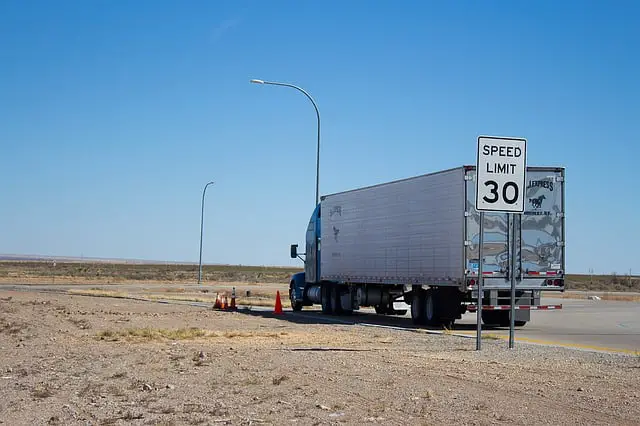Truckers usually have a demanding job. One has to work with strict deadlines, covering vast distances at a go. In the process, the cargo needs utmost care, as no damage is acceptable. In this job, one needs to allow time for rest stops, checks, as well as an additional allowance for unexpected delays along the road.
If you have to contend with all these factors, more often than not, there isn’t enough wiggle room regarding available time. However, a key consideration is allocating time for the vital traffic stops, primarily at weigh stations.
Weigh stations are strategically positioned scales on the side of the road. These weight scales adjoin to an office for the station employees. The Department of Transport oversees all inspections on commercial vehicles.
The process begins with a measure of the GVWR (Gross Vehicle Weight Rating) of the vehicle. A walk-around check by the DOT officer may necessitate pulling over of the truck for closer inspection, and your vehicle remains subject to such a review.

Inspections at weigh stations range from level 1 to 6, with the most comprehensive being a level 1. A level 1 check is thorough, assessing the freight as well as the driver. Tests on freight limits assess the weight on axles, with some scales single-axle and others multi-axle.
Temporary or portable scales are common in agricultural areas during harvest time. Permanent weighing stations are located at suitable spots for regular weight checks regardless of time and season. It is advisable to remain keen for road signs that indicate the presence of a weighing station, as failing to may have serious
consequences.
When are you required to stop?
There are different regulations set out to govern the weight checks on commercial vehicles. AAA has a comprehensive guide that outlines all traffic requirements by the state regarding the state by state regulations. Here’s a brief of the set laws, which vary by state:
Basic Requirements
A considerable number of states have the requirement for weight checks as a straightforward 10,000 pounds GVWR. These states require checks for all vehicles using that as the basic rule:
- Alaska
- Hawaii
- Indiana
- Kentucky
- Iowa
- Minnesota
- New Jersey
- North Dakota (except recreational vehicles)
- Ohio
- Rhode Island
- Washington
- Wisconsin
More Advanced Requirements
Agricultural states, as well as their neighbors, work hard to ensure food safety. This precaution includes road checks for trucks involved in the production,transport, or other food management processes. These states accompany that regulation with tests for the passenger as well as any specialty vehicles with at least 10,000 pounds. GVWR, and commercial units within that weight range. Larger trucks typically undergo checks in these states.
These are some of the states that use that specific criterion for freight regulation:
- Arizona
- Arkansas
- Florida (including vehicles ferrying hazardous material)
- Georgia
- Louisiana
- Massachusetts
- Michigan
- Nevada
- Pennsylvania
Advanced Requirements
Other regions prefer to use designated officers to pull over trucks and initiate checks, either by portable or stationary equipment. In some situations, portable scales are unavailable. If that is the case, the officer is allowed to request the driver to drive to a weighing station for necessary checks to take place, usually within two or three miles. Road signs augment this mechanism,directing truckers on where to make the expected stops for freight checks.
These are the states that have adopted that approach in enforcing freight laws:
- Alabama
- New Hampshire
- North Carolina
- Utah
- Vermont
- West Virginia
California –all commercial vehicles with a GVWR of at least 26,000 pounds are subject to checks
Colorado – all trucks with at least a 26,000 pounds. GVWR
Connecticut – mandatory inspections for all commercial vehicles
Delaware – The DPS Secretary determines weight monitoring regulations
District of Columbia – N/A
Idaho – there are ten fixed ports and ten mobile scales
Illinois – police officers have the mandate to initiate checks on vehicles suspected of overloading
Kansas – all registered trucks are subject to checks as directed by regulation signs. Police officers may start checks on vehicles suspected of overloading
Maine – police officers may initiate inspections, and trucks must drive into weighing stations for weight checks and review of the necessary paperwork
Maryland –the Department of State Police operates seven stations that conduct inspections on agricultural, commercial vehicles with 10,000 pounds GVWR. Commercial buses with more than 16 passengers and hazardous material haulers that require placards.
Mississippi– officers from the State Tax Commission, highway patrol, tax collectors along with other authorized parties initiate checks. This rule applies in Oklahoma as well.
Missouri – all commercial trucks with an 18,000 pounds GVWR
Montana –Agricultural trucks with 8,000 pounds. GVWR or more, as well as used RVs on the way to a distributor
Nebraska –all vehicles weighing over 1 ton, except pickup trucks towing a recreational trailer
New York –the state has both fixed and portable stations for regular and random enforcement
Oregon – there are mandatory checks for vehicles weighing 26,000 pounds or more
Tennessee –Statewide inspections for adherence to state and federal restrictions regarding size and weight. The safety and driver regulations remain closely monitored
Texas – All commercial vehicles are subject to freight checks
Virginia – checks are necessary for all vehicles weighing 7,500 pounds or more
Washington –there are stops at traffic weight inspection stations for all agricultural trucks as well as commercial units with a GVWR of 10,000 pounds. or more
Wyoming –commercial vehicles shall stop as instructed by the black and white regulatory signs, or as required by an officer of the law. Officers with competent jurisdiction may initiate checks on vehicles via portable or stationary equipment
For large trucks weighing 150,000 pounds or more need a ready permit, or express permission to enter the state for the purchase of a license. This permit is for the vehicle to come and operate within the state of Wyoming freely.
Puerto Rico– truckers should follow the set instructions on roads, paying keen attention to signs and signals that facilitate weighing procedures. In this state,weighing stations are primarily permanent structures.
Why are weighing stations necessary?
Trucks or commercial vehicles remain subject to freight checks on the road. Weighing stations, either portable or stationary play a crucial role in enforcing this facet of traffic regulations. It is vital that one understands the critical importance of these elements of road safety to appreciate them truly. This way,when you see the weigh station signs, compliance comes easily.
These are the core reasons why truck weight needs monitoring:
Maintaining healthy roads
Trucks have a set limit, with federal law dictating that truck weight must not exceed 80,000 pounds. With a vehicle tipping the scales beyond this point, the road subsequently suffers damage over time. With constant overloading, the state incurs a considerable additional financial burden in maintaining road frameworks. The critical consideration in setting road weight restrictions is the weakest point or a road, specifically bridges and overpasses. This proactive approach ensures that there’s no unwarranted damage on state roads.
Vehicular safety
Load limits play a crucial role in maintaining vehicular security. An overloaded vehicle is a risk to the driver, as well as other road users. Commercial vehicles carry a considerable load, and this calls for keen observation of factors that may affect handling. With the recommended weight limit exceeded, steering becomes areal challenge, especially in extreme weather. Poor visibility and slippery roads are bound to cause accidents, resulting in damage to road infrastructure,vehicles, ferried goods, and even human fatalities.
Taxes
Weight measures go a long way in facilitating the calculation of taxes payable by individual vehicles. Considering that trucks put a notable level of stress on state roads, knowing their weight assists in calculating the amount of levies each should bear. For vehicles to legally ferry weights above the recommended limit, a split is necessary. Alternatively, the trucker must bear a special permit to ferry a load above the recommended limit. For this reason, companies and individuals should endeavor to know their weight before setting out on a delivery.
Different states have different regulations regarding the issue of weight regulations.For the best experience, make proper background checks on the legal limits in the region you intend to ferry loads. The legal limit helps you make a comparison with the weight of the truck before the journey begins, at which point you can decide if a split or special permit is necessary for a flawless trip. As with all vehicles, perform a proper mechanical check on your vehicle to avoid unforeseen breakdowns and further delays on your trip.
